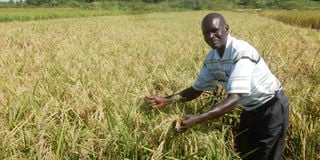Government to develop irrigation policy

A farmer at a rice farm in Olweny irrigation scheme, Lira District. PHOTO BY BILL OKETCH
What you need to know:
- Nakasongola District chairman, Mr James Wandira, emphasised that there must be enough coordination if water for production campaign is to succeed.
- He also noted that water for production would facilitate agriculture sector thereby creating job opportunities to thousands of jobless Ugandans.
LIRA. Government is in the process of developing a National Irrigation Policy in a move to guide its irrigation development and expansion.
The development comes at a time when President Museveni is looking at modernising Uganda’s agricultural sector.
Since independence (1962), Uganda has been without a consistent and comprehensive policy to guide its irrigation development and expansion. Irrigation development has always been dictated and affected by ad-hoc government agricultural strategies and programmes.
According to official statistics, Uganda has irrigation potential of 3.03 million hectares. Out of that, the current coverage in irrigation is 0.5 per cent. The total land under irrigation is around 15,000 hectares countrywide. Uganda has the lowest percentage in East Africa in terms of utilizing its irrigation potential. Tanzania is at 3.6 per cent, Kenya is at 2 per cent and Burundi at 1.6 per cent.
An official from the ministry of water informed the Inter-district coordination and engagement forum in Lira Town on Thursday that the National Irrigation Policy is being developed because government is taking water for production seriously.
“I am personally heading a team responsible for preparation of a National Irrigation Policy,” Eng John Twinomujjuni, Commissioner for Water for Production (WfP) confirmed.
He explained that government was looking forward to having a proper national irrigation policy because “people want to know, if I want to do irrigation, whom do I approach, what do I have to contribute and what is available for me?”
“So all those issues are addressed in the draft National Irrigation Policy, and I have all the confidence that at least by February we should have a national irrigation policy in place which will help everybody,” he said.
Mr Twinomujjuni added: “Am glad to report that the draft National Irrigation Policy is ready, we have already secured Certificate of Financial Implication from Ministry of Finance and has already been cleared by the Cabinet Secretariat.”
He also announced that there are plans to construct 130 micro irrigation systems countrywide.
The economy of Uganda is highly vulnerable to climate change due to its impacts on key sectors such as agriculture, fisheries, water resources, forestry, energy, health, infrastructure and settlements.
In 2011 alone, Uganda lost an estimated Shs4.3 trillion as a result of climate change, according to a study carried out by the Department of Disaster Preparedness in the Office of the Prime Minister that same year. This translates into 7.5% of the country’s GDP.
“Climate change is real and water for production is the way to go for everyone if we love our communities,” said Ms Stella Akello, a sociologist with Water for Production.
Today, agriculture sector is the biggest employer in the country, employing about 90 per cent of the Ugandan population, but the country has no capacity to produce enough food because of unreliable rainfall.
The government invested Shs42 billion in the rehabilitation of Olweny Irrigation Scheme that started in the early 1940s, and was later abandoned. Today, the scheme covers Itek and Okile smallholder rice projects in Barr and Agali sub counties in Lira District.
Nakasongola District chairman, Mr James Wandira, emphasised that there must be enough coordination if water for production campaign is to succeed.
He also noted that water for production would facilitate agriculture sector thereby creating job opportunities to thousands of jobless Ugandans.
“We are next to our people here who are very lazy – the Congolese and South Sudanese – if we become food basket here, am telling you there is no way we shall cry of poverty. Let’s take advantage of these lazy people with their dollars, utilize water for production, produce enough food both for consumption and commercial,” Mr Wandira advised.




